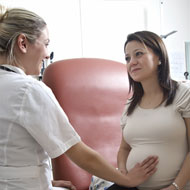Continue to Try and Concieve After Chemical Pregnancy
Getting Pregnant after Chemical Pregnancy
Submitted by Jenifer on January 18, 2013
A chemical pregnancy is a term that is used for an early miscarriage. Research has shown that almost 70% of conception results in miscarriages. While some women may not even be aware of a chemical pregnancy, while others take an early pregnancy test before their periods are due and discover a faint positive only to get their periods a few days later. Most women worry about their chances of getting pregnant again after a chemical pregnancy, and within reason.
read more...
Related Articles

Pregnancy And Baby Care Questions
Continued...
The reasons for the occurrence of a chemical pregnancy are still not known, but most medical experts speculate it is because of chromosomal problems in the developing fetus. There could be other reasons such as fibroids, inadequate uterine lining, decreased hormone levels, luteal phase defect, or uterine abnormalities.
There are a few things that you will need to keep in mind before trying to conceive again, these are:
- HCG levels – They are increased if pregnant.
Doctors recommend the HCG levels coming back to normal before trying again. - Bleeding – While some women may experience light flow of blood while other may experience heavy bleeding that may last for up to 10 days.
- Menstrual cycle – It takes awhile for the body to get back to its normal menstrual cycle after a miscarriage. It may take up to 6 to 7 weeks before your normal periods arrive. Ovulation is highest 14 days after a miscarriage, and doctors often recommend steering clear of those days as the body needs time to heal before preparing itself for another pregnancy.
- Sexual intercourse - it is best to avoid sex till the bleeding has ceased and post the ovulation period. The cervix is closed when bleeding but the sperm can still travel through it and introduce infection to the healing uterus.
- Grief – Women tend to grieve the loss of their child especially if they are trying hard to conceive. It best to avoid getting pregnant till the feelings of grief are overcome.
Consult a doctor about conceiving again before trying to get pregnant. He might recommend certain tests and ultrasounds to rule out any issues with infertility after the chemical pregnancy. Most doctors say it is ok to start trying to get pregnant right after a chemical pregnancy while some ask you to wait for another cycle before you try to conceive again. All this depends largely on previous medical health conditions, and your psychological state at that time. Women who are trying hard to get pregnant may find it difficult to cope with their loss, and be overcome with grief. Doctors don't recommend that women try to get pregnant during this emotional stage.
Most women who have had a chemical pregnancy go on to have healthy and happy pregnancies in the future. Studies have shown the chances of repeated chemical pregnancies are quite low, so if you have experienced two or more chemical pregnancies, it would be advised to consult a doctor to check for underlying reproductive problems.
Read more articles from the Fertility Category.

Source: https://www.pregnancy-baby-care.com/articles/1187/fertility/fertility-after-chemical-pregnancy.html
0 Response to "Continue to Try and Concieve After Chemical Pregnancy"
Post a Comment